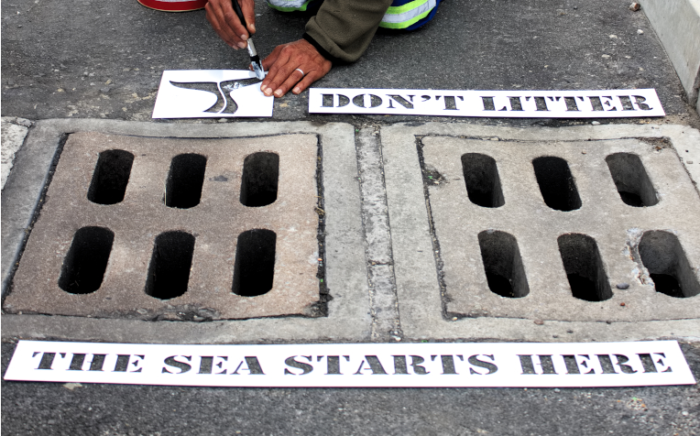The Overstrand Municipality is setting an example for the Mother City with their continued efforts in ocean conservation. Fighting back against the plastic plaguing our seas, their latest efforts are something to admire.
After surprising locals with their innovative litter-trapping stormwater nets in Gansbaai earlier this year, the municipality have now partnered with Marine Dynamics and the Dyer Island Conservation Trust to further minimise the waste that reaches our oceans by painting signs on all stormwater drains saying, “Don’t Litter. The Sea Starts Here”.

This is the second phase in Project Storm, which began with the storm drains nets in June and has now advanced to include these friendly yet impactful stencil paintings reminding locals where the ocean starts.
Since the launch of the 12 nets earlier this year, a shocking 113kg of waste has been collected with the most commonly collected waste being cigarette filters at roughly 2 5671 filters found among other common waste items including food packaging and plastic bottles.

Councillor Riana de Coning remarked that it is very important to remind the public just how easily plastic makes its way into the ocean, “Everything that flows down the storm water drain, including discarded waste, ultimately flows into the ocean.”
The stencils were chosen with inspiration from the Cape Whale Coast which Gansbaai is part of and so a whale tale was included in the design.
“We draw inspiration from the great work being done by Knysna Municipality that recently launched the seahorse stencil campaign. The stencils are phase two of Project Storm building on from the storm drain nets that were placed in June 2019,” says Wilfred Chivell of Marine Dynamics Tours and founder of the Dyer Island Conservation Trust.
The Dyer Island Conservation Trust realised the need for drain nets and more awareness from the public and decided to partner with the local municipality and make a change. They monitor the nets and have recorded some surprising statistics since their launch. Roughly 12 118 food wrappers/containers were found, 4 663 microplastics, 3 515 foil pieces and 3 459 plastic pieces to name just a few.
Overall, 299 different food wrappers were counted from 30 different brands all being non-recyclable.
Gansbaai is setting an example that the Mother City would definitely benefit from following and we cannot wait to see what innovative things they do next.
Also Read: First litter-trapping stormwater net launches in Gansbaai
Picture: Dyer Island Conservation Trust

